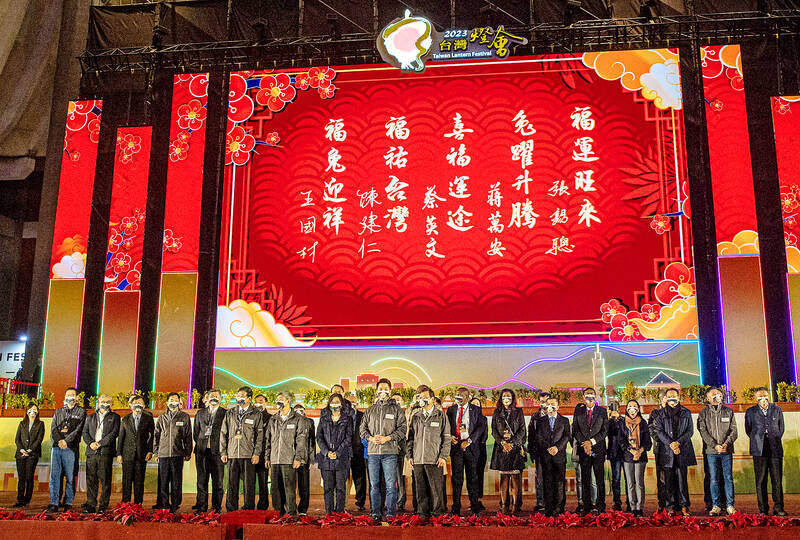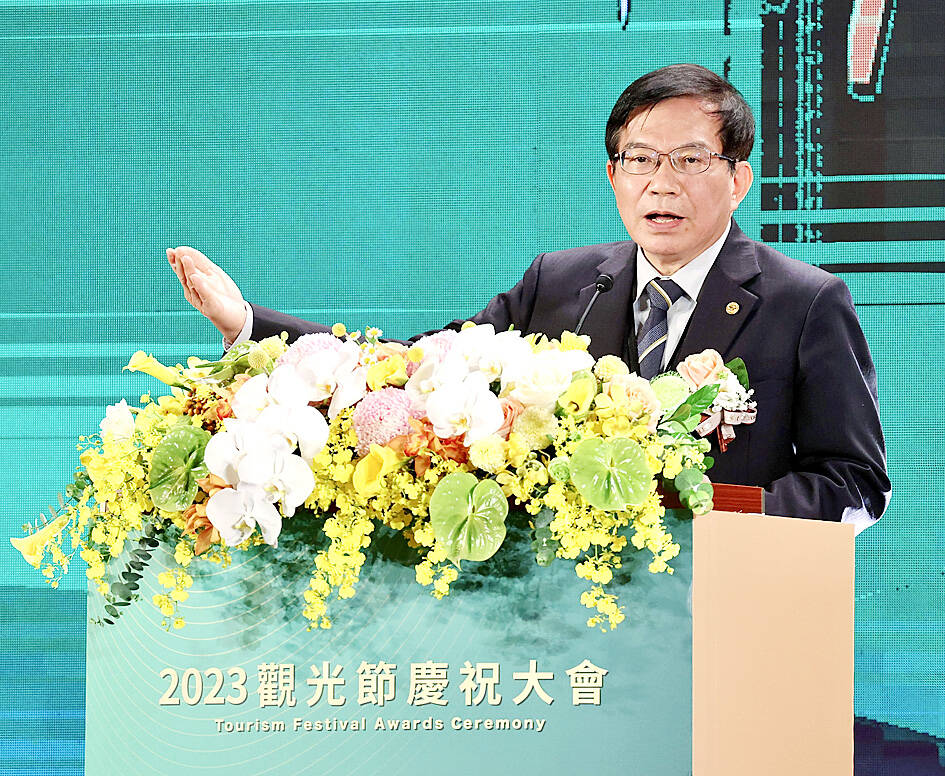The government is to spend NT$6 billion (US$200.69 million) on incentives to attract more than 6 million international tourists to Taiwan this year, including offers of free high-speed rail tickets with plane ticket purchases, Minister of Transportation and Communications Wang Kwo-tsai (王國材) said.
The budget would be funded by surplus national tax revenue from last year, according to a draft “special statute to bolster economic and social resilience and sharing economic achievement with all people in the post-pandemic era,” he said on Saturday.
The discount programs include offering free high-speed rail tickets with purchases of plane tickets to Taiwan, vouchers for tourists to exchange for fresh fruit at convenience stores, half-day tours for transit passengers and a NT$500 electronic payment card — such as an EasyCard or iPass — for independent travelers, Wang said.

Photo: CNA
As many hotels are short of hotel housekeeping staff, part of the budget would be used to subsidize the salaries of housekeeping employees, he said.
The details would be announced later, Wang said, adding that the subsidies could be offered as soon as April, as long as the special statute and the proposed budget are passed.
The special statute also includes a proposed three-year NT$20 billion budget to subsidize a monthly public transportation pass, and a NT$2.5 billion budget for improving tourist shuttle routes, and adding high-speed rail stations and key railway stations to them, as well as improving sightseeing routes suggested by local governments, he said.

Photo: Fang Pin-chao,Taipei Times
To promote the nation, more than 200 international travel agents have been invited to the Taiwan Lantern Festival, Wang said.
They are also to visit many attractions across the nation, so that they can gain an understanding of Taiwan in the post-COVID-19 era and design tour packages appropriately, he said.
The Taiwan Lantern Festival was officially launched in Taipei yesterday, and runs through Feb. 19.

Photo: CNA

Taiwan is projected to lose a working-age population of about 6.67 million people in two waves of retirement in the coming years, as the nation confronts accelerating demographic decline and a shortage of younger workers to take their place, the Ministry of the Interior said. Taiwan experienced its largest baby boom between 1958 and 1966, when the population grew by 3.78 million, followed by a second surge of 2.89 million between 1976 and 1982, ministry data showed. In 2023, the first of those baby boom generations — those born in the late 1950s and early 1960s — began to enter retirement, triggering

ECONOMIC BOOST: Should the more than 23 million people eligible for the NT$10,000 handouts spend them the same way as in 2023, GDP could rise 0.5 percent, an official said Universal cash handouts of NT$10,000 (US$330) are to be disbursed late next month at the earliest — including to permanent residents and foreign residents married to Taiwanese — pending legislative approval, the Ministry of Finance said yesterday. The Executive Yuan yesterday approved the Special Act for Strengthening Economic, Social and National Security Resilience in Response to International Circumstances (因應國際情勢強化經濟社會及民生國安韌性特別條例). The NT$550 billion special budget includes NT$236 billion for the cash handouts, plus an additional NT$20 billion set aside as reserve funds, expected to be used to support industries. Handouts might begin one month after the bill is promulgated and would be completed within

NO CHANGE: The TRA makes clear that the US does not consider the status of Taiwan to have been determined by WWII-era documents, a former AIT deputy director said The American Institute in Taiwan’s (AIT) comments that World War-II era documents do not determine Taiwan’s political status accurately conveyed the US’ stance, the US Department of State said. An AIT spokesperson on Saturday said that a Chinese official mischaracterized World War II-era documents as stating that Taiwan was ceded to the China. The remarks from the US’ de facto embassy in Taiwan drew criticism from the Ma Ying-jeou Foundation, whose director said the comments put Taiwan in danger. The Chinese-language United Daily News yesterday reported that a US State Department spokesperson confirmed the AIT’s position. They added that the US would continue to

The National Development Council (NDC) yesterday unveiled details of new regulations that ease restrictions on foreigners working or living in Taiwan, as part of a bid to attract skilled workers from abroad. The regulations, which could go into effect in the first quarter of next year, stem from amendments to the Act for the Recruitment and Employment of Foreign Professionals (外國專業人才延攬及僱用法) passed by lawmakers on Aug. 29. Students categorized as “overseas compatriots” would be allowed to stay and work in Taiwan in the two years after their graduation without obtaining additional permits, doing away with the evaluation process that is currently required,